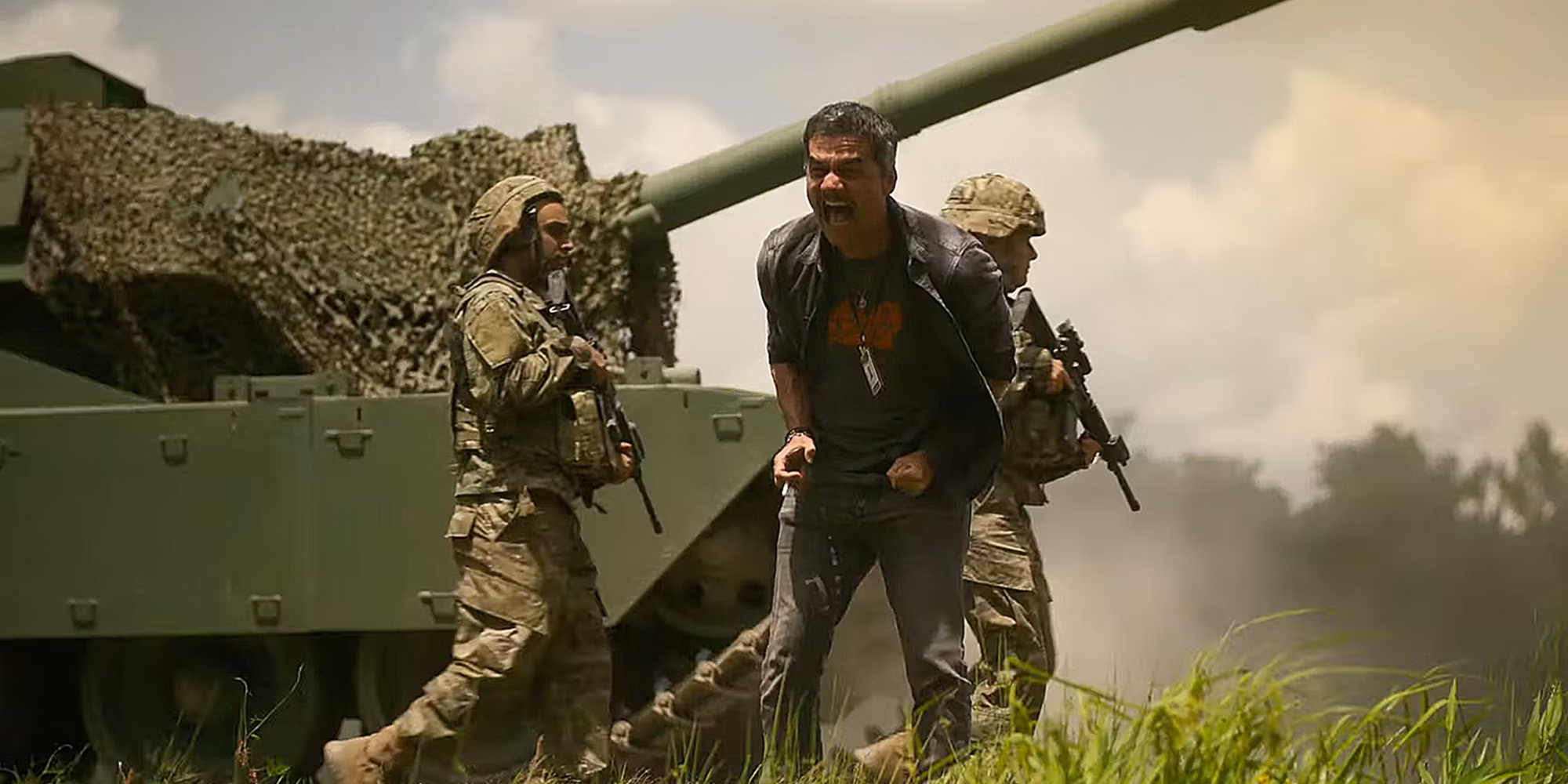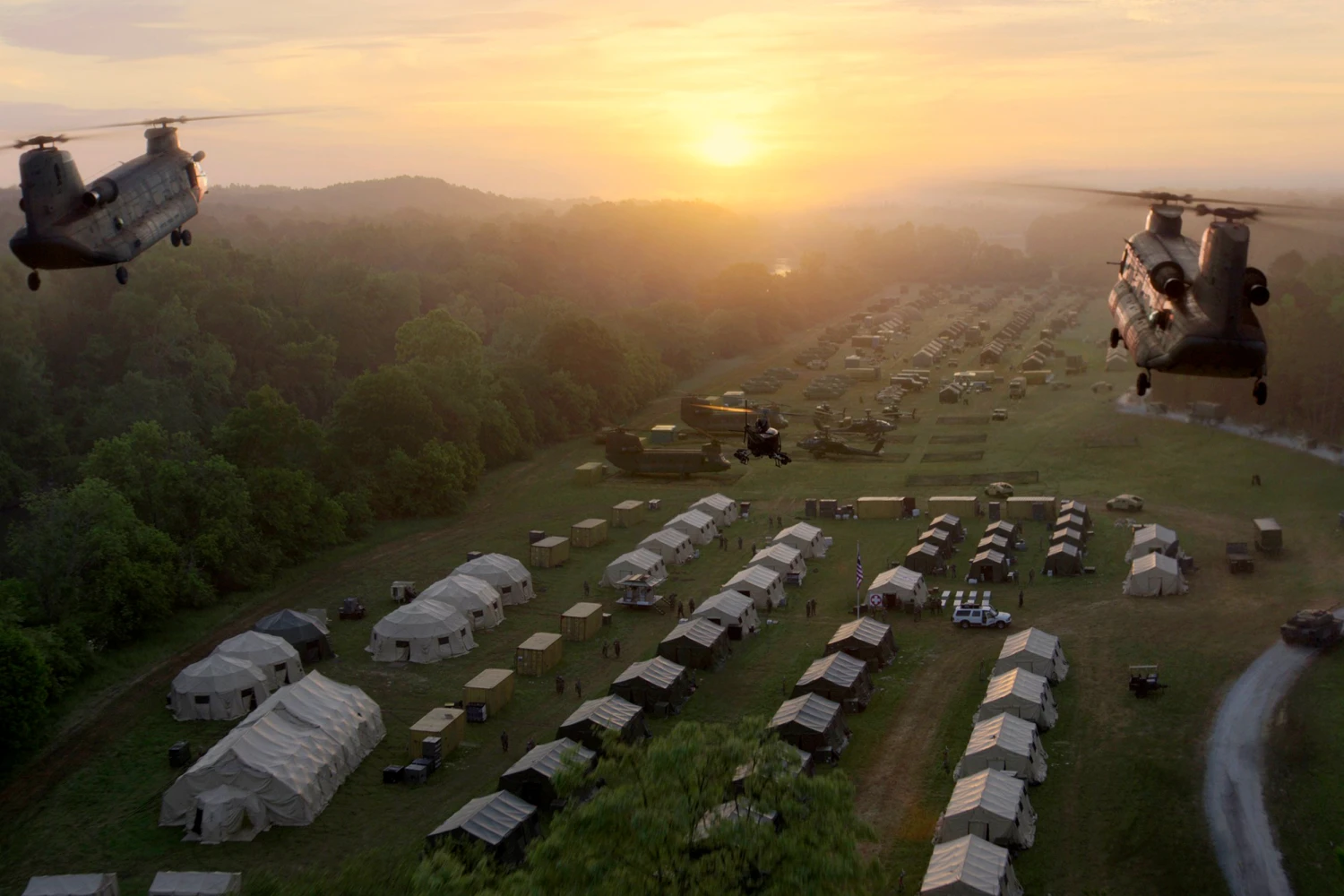OMG… I am now explaining What Civil War is Saying Because No One is Getting It. My ears are just SCREAMING at me. RPX + Alex Garland + Civil War = just the most intense case of tinnitus I’ve ever had. Frick. WHAT WAS THAT?? YER GONNA HAVE TO SPEAK UP. This film is an enormous idea movie and I’m having trouble parsing why people are giving Garland such a hard time for being apolitical. I mean, did they totally misunderstand the movie? I’m just going to go with the big fat assumption of yes, yes they are misunderstanding it.
The problem with A24’s biggest movie of all time is a simple issue of optics and presumptions. The title of the movie is called Civil War. So that’s problem #1. With that title, you IMMEDIATELY jump on over to Donald Trump, and Ultra-Hardcore QANON craziness. It’s just the detail no one is saying out loud but everyone is thinking. But there is none of that in this movie. Problem #2? Is that it’s a United States civil war movie that isn’t about anything. It’s not about slavery. It’s not about 1st or 2nd amendment issues. The only hint at an alignment is that it is something that would have aligned Texas and California together. We are talking about polar opposite states. What would cause that? What sort of issue? Federal Government disproportionately taxing these two states to account for the funding needs of the rest of the country? There is no policy issue these two states would align on. None. The only hint I have is that it would be a fiscal/tax issue. Anyone else have any better ideas? I’d love to hear about it in the comments.
The larger problem that audience and critics don’t seem to be groking is that this is not… at all… nor will it… ever be… a political movie. Which, seems to be a bit of anathema to many who are coming out and wondering what it is that they just watched. Assassinations. Mass burial graves. Suicide bombers. Stray bullets. This movie’s closest corollary? Black Hawk Down… believe it or not. And while this isn’t a political movie, it does capture on the brink of something. A nation on the precipice. And that might be the one detail that is causing so much angst with audiences. Could it be that Alex Garland is being exploitative? Funny you should leap to that conclusion because that happens to be the entire point of the movie. Let’s see if we can work through it and make heads or tails of this film.

Ending of Alex Garland’s Civil War Discussed
The entirety of the movie’s first 90 minutes is all about Lee, Jessie, and Joel slinging their way through the military’s defenses, then off to the insurgents, snapping photos left and right, of absolutely anything and everything that they can get their hands on. And, as they head into D.C., the insurgents blast their way into the nation’s capital, hell-bent on finding and killing the President. Make no mistake, this movie is not stopping until it gets what it wants, and that is the President dead.
As these journalists follow closely and watch as this new chapter in the nation’s history unfolds, we watch as Jessie is taking award winning photo after award-winning photo. It’s definitely a target rich environment. At one point, Jessie goes one step too far, and she finds herself standing, in the open, in a hallway in the capital… and she’s going to die. But Lee jumps in, pushes her out of the way, and takes the bullets intended for Jessie. And all the while, Jessie is continuing to shoot.
This is an important detail some are missing here. Remember when Lee and Jessie watch as two different looters get executed at that eerie gas station? They share a bit of dialog together, “Would you photograph that moment if I got shot?” Jessie tearfully asks. Lee’s response is about as cold and calculating as you would imagine it to be – “What do you think?” Lee is basically telling Jessie, you need to kill that part of your brain. You need to compartmentalize this from the rest of your normal daily survival details. And instead, you need to callous those super thing fingers of yours because it’s about to get hard.
My first thought when I saw that unfolding? “WITNESS MEEEEEEE!” from Mad Max Fury Road. Sad as it maybe.
But to take that as some sort of political revelation? Or some sort of Left Leaning, or Right Leaning bias? That is not what this movie came here to discuss with you. Not even a little bit. Instead, it seems to want to talk about our freedom of the press and the curiosity of whether or not it’s all a part of the larger problem of what is going on here. The shamelessness of it anyway. Not the RIGHTs of it. No. But rather the exploitativeness that we watch these two brilliant war correspondents do.
What happens next though? As the movie winds down we watch as Jessie doesn’t even check Lee’s body for a pulse. She doesn’t see if there is anything that she can do medically for her mentor and “friend” and instead, she quickly moves on for the “kill shot.” She walks into the Oval Office where the president is found gripping his desk and being dragged out. (Reminiscent of Saddam Hussein’s extraordinarily ignominious ending.) Where Joel stops the execution in order to ask the question he’s been thinking about throughout the entirety of the whole movie. Will you ask him why he allowed the air bombings of American civilians? etc., etc. He’s obviously a horrible person, and he’s been actively avoiding this fate throughout the duration of the uprising by hiding within his newly walled off office. So Joel gets his moment and what does he say?
“Wait! Wait! I need a quote!” To which the President replies with a garbled cry “Don’t let them kill me!” And Joel responds with, “Yup, that’ll do.” At which point the cabalists riddle the man with bullets. Jessie captures the president’s death, and we roll credits.
The Ending of Civil War Explained
Alex Garland has compared the final photo of the film to similar photos that have been taken by law enforcement and other military photos in the past. He even mentioned a similar shot that was taken of Pablo Escobar upon his own death. But this is America. Americans killing Americans. As I’ve mentioned before, the complexity of the unextractable political melange that overlays the proceedings is everywhere. This isn’t a story of American photojournalists coming of age story. And yet, that is where our focus is. We watch as Jessie is mentored by Lee. Trained by Lee, and guided by Lee. It’s 100% a coming of age story. And yet, none of that matters.
With that in mind – really the only possible message that could be coming from this politically maligned film is specifically a condemnation of the modern journalistic blood-lust. I don’t have a clue as to whether or not that is what Garland’s intent was. But there literally can be no other way to read this film. It’s 100% about the shocking realization that our country will do absolutely anything (including, and especially, dying) to get “the shot.” This film could have made this message clearer set in a 3rd world country… Columbia, or Zambia or something. And we could have heard this specific message way more clearly.
And did I mention this movie is shocking? It is so shocking that I about jumped out of my seat numerous different times. Necklacing. Assassinations that come completely out of the blue. Mass graves. It’s a melange. So it’s very difficult to differentiate between the commentary on our current political chaos, and the discussion of our journalistic blood-lust. Why? Because it isn’t clear who is good, and who is bad in this film. We don’t know if the Western Forces are our liberators from a horrific and tyrannical leadership. We don’t know if the President deserved what he got. We don’t know if there is anyone good in either of these forces.
And that might be the larger point here. There is a moment where the group errantly ends up under fire by a sniper. Joel wants to know whether or not the military personnel they are hunkered down with are WF or standard issue military, and who the sniper is that is firing on them. And it’s Jessie that ends up clarifying it for him… “We are being shot at…” The point being, violence… real violence… is indiscriminate and pointless. In the throes of war, nothing makes sense. And it is the journalists that are there to try and frame the story in order to make sense of it all.”
THIS! (Sorry, pardon the epiphany that is coming mid-screed… but this is starting to make sense to me.) This might be Garland’s larger point. The sheer insanity of war is what it is… insanity. Violence begets violence. And it doesn’t matter if it’s coming from the “good side” or the “bad side.” It just doesn’t. And, worse yet… when we embed journalists who try and get “the shot” and clarify things for us – in that very act – we are JUSTIFYING the insanity of it all. Capturing the assassination of the president of the United States justified it. Regardless of how you spin it, murdering a man in cold blood is immoral. Full stop. Did he warrant being executed? Well, maybe, but shouldn’t a court (kangaroo or otherwise) decide that as opposed to 3 people hopped up on adrenaline and speed?
A Few Random Thoughts on Civil War
I will say that a wide swath of Alex Garland’s past connections come back as sort of a who’s who throughout this film. First you have Offerman, who was the genius in the absolutely incredible show Devs (Deus is more accurate but I’m spoiling things now.) There is Sonoya Mizuno who was huge in Devs as well as also in Ex Machina. And for sure, if you haven’t seen Garland’s other films, you would do well to watch them all.
Personally – this was a visually arresting, and mind-blowing film. The fact that Garland pulled this film off for something like $50m is unbelievable to me. I grew up on the streets of Washington D.C. and the war rages literally on those streets. Obviously it didn’t happen… so how did they manage it? Big massive green screen stages and CG? Like, that should be exorbitantly expensive. My head really can’t wrap around the solution.
There was no way that Alex Garland could make a big budget movie about the state of the union for Republicans and Democrats and the levels of hyperbole and vitriol in our public discourse. And the fact that this is where we are headed if we all don’t just chill a bit. Why? Because it would have inevitably tipped to one side or the other. He couldn’t have written an impassive diatribe. But to frame it in the world of journalism? He gets away with it. (It’s already the largest box office success for A24, and it’s only been out a weekend.) But to pull the teeth from this larger discussion? Basically turns it into an anti-free press screed. No? Or more a …. well, this is where it all logically goes, if not a screed.
But to say I loved this film is an understatement. It was gorgeously wrought. Just gorgeous. Could it have gone all in and said the silent thing though – “Hey, America, we are all one people… shouldn’t we work harder at listening to the other side? Otherwise, this is where we are all heading.” But maybe I’m being Pollyannaish again. Who knows.
Edited by: CY

